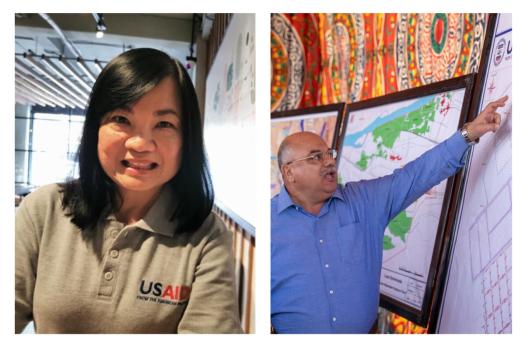USAID Recognizes 2020 Water Warrior Award Winners
On March 22, USAID joined partners across the globe for World Water Day to highlight the importance of increasing water security and bringing safe drinking water and sanitation to the world’s poorest and most vulnerable. Recognizing World Water Day is all the more important as we collectively respond to the novel coronavirus (COVID-19) pandemic. Addressing short- and long-term water security is critical to combating the health and economic impacts of COVID-19 in the countries and vulnerable communities we work in and to maintain progress in development despite this shock.
USAID is pleased to announce the launch of the Agency’s first-ever Water Warrior Awards to recognize the dedication of USAID Mission staff and their important role in advancing the Agency’s investments in water, sanitation, and hygiene (WASH).
Trigeany Linggoatmodjo and Atef Abdel Sayed, who are long-serving WASH leads at USAID’s Indonesia and Egypt Missions, respectively, exemplify the dedication to water security, including safe drinking water, that we honor each year on World Water Day.
We recognize Ms. Linggoatmodjo for her work leading the creation of an innovative partnership with the Government of Switzerland to reduce non-revenue water and increase efficiency of seven water utilities. In 2019, USAID mobilized nearly $74 million from the private sector, the Government of Indonesia’s national and local government budgets, and other donors, including a $4.5 million contribution from the Swiss State Secretariat for Economic Affairs, to support USAID’s ongoing IUWASH PLUS activities.“It is an honor for me to facilitate the expansion of the partnership between the U.S. Government and the Government of Indonesia to accommodate the support from the Swiss Government to reduce water loss and increase energy efficiency that will ultimately lead to an increase in access to water for Indonesian citizens,” says Ms. Linggoatmodjo, who manages IUWASH PLUS, USAID’s flagship WASH activity in Indonesia.
The funding enabled the expansion of project-supported services, which provided an additional 60,000 people with access to water services for an overall project total of 1.1 million people with improved access to water supply. At least 500,000 of these customers come from the poorest 40 percent of the population. The project will also benefit 500,000 people with increased access to safely managed sanitation services. “The Indonesian government,” says Ms. Linggoatmodjo, “will learn and take lessons from this activity to develop a performance-based grant in improving the efficiency of water service delivery.”
We recognize Mr. Sayed for his leadership role within the mission over the past two decades and his commitment to building strong institutions and enduring government relationships to ensure sustainable service delivery. His duties and responsibilities include managing three large water-related projects. The activities Mr. Sayed leads have netted clear results—over the past five years alone, outputs such as the construction of seven desalination plants, four reservoirs, eight deep wells, and four wastewater treatment plants have led to overall improved wastewater services for 250,000 people and potable water for 350,000 people.
"For nearly 20 years I have served the people of Egypt through my work at USAID,” says Mr. Sayed. “I am so proud of what we have achieved in this sector, from constructing facilities serving millions of people to building the capacity of my Government of Egypt colleagues who now operate and maintain Egypt's water and wastewater services and facilities in a sustainable manner.”
The types of projects Ms. Linggoatmodjo and Mr. Sayed lead, along with activities geared toward water resources management, governance and finance, and improved access to sanitation, are key parts of USAID’s approach to global water security. Since 2008, USAID’s water and sanitation assistance has helped 42 million people gain access to improved drinking water services and 27.2 million gain access to improved sanitation services.
While we recognize significant progress this World Water Day, three in 10 people still lack safe drinking water in their homes and nearly 300,000 children under age 5 die each year as a result of unsafe drinking water, sanitation, and hygiene.
USAID has established a Center for Water Security, Sanitation, and Hygiene in the new Bureau for Resilience and Food Security (RFS) to elevate its work on water security. Through the new center, USAID will continue to focus on meeting the basic need for safe drinking water and leveraging the role of water security in helping countries to advance on their journeys to self-reliance.
By Portia Persley, USAID RFS Center for Water, Sanitation and Hygiene


